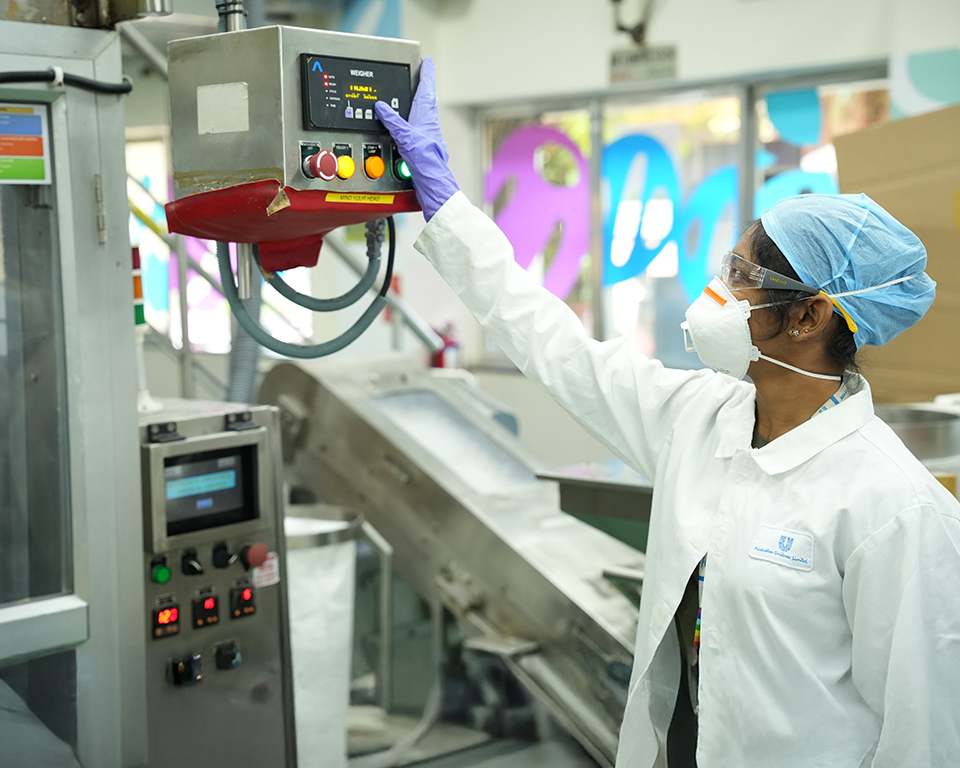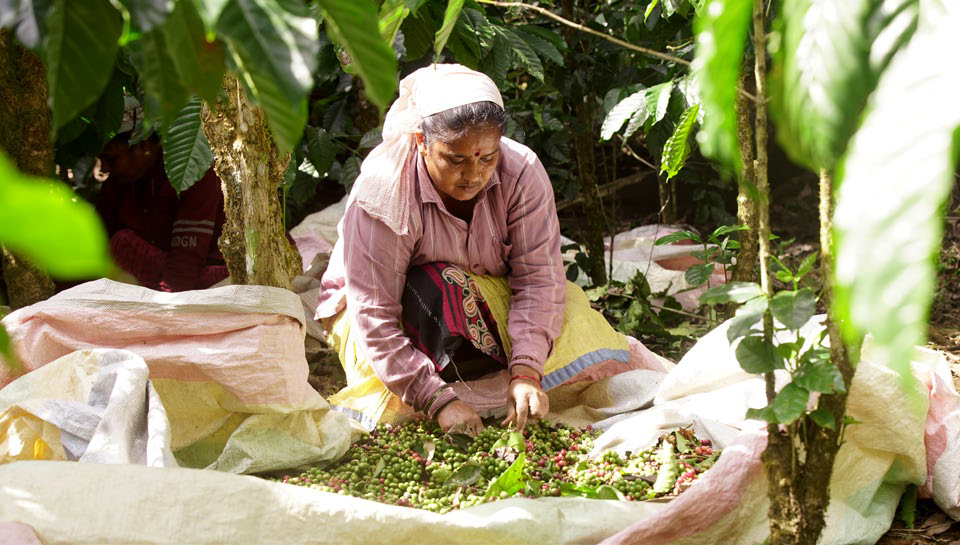
BUSINESSES SHOULD RESPECT AND PROMOTE HUMAN RIGHTS
Our commitment to human rights governance is unwavering, and we continuously strive to improve our practices and uphold the dignity and rights of all individuals within our sphere of influence. Through proactive measures, swift responses to challenges, and collaborative efforts with our partners and stakeholders, we are dedicated to fostering a workplace and supply chain environment where human rights are respected, protected, and promoted. Together, we are shaping a future where fairness, equality, and inclusivity are integral to our operations, contributing to a more sustainable and responsible business landscape.
Message from Our
Leadership

"HUL places an unwavering commitment to human rights at the core of its corporate values and operations. By implementing a comprehensive framework that includes robust policies, proactive measures, and continuous monitoring, HUL upholds the highest standards of ethical conduct. This dedication not only mitigates risks but also cultivates a respectful and equitable business environment, setting a benchmark for corporate responsibility.”
Arun Neelakantan Executive Director, Customer Development
0%
Assessment of own plants and offices on human rights
0%
Permanent workers are paid more than minimum wages
0%
Suppliers assessed
on human rights
0%
Permanent employees are paid more than minimum wages
Essential Indicators
EI-1. Employees and workers who have been provided training on human rights issues and policy(ies) of the entity, in the following format:
| Category | FY 2024-25 | FY 2023-24 | ||||
|---|---|---|---|---|---|---|
| Total (A) | No. of employees/ workers covered (B) | % (B/A) | Total (A) | No. of employees/ workers covered (B) | % (B/A) | |
| Employees | ||||||
| Permanent | 7,693 | 6,325 | 82.2% | 8,245 | 7,689 | 93.3% |
| Other than permanent | 509 | 147 | 28.9% | 410 | 295 | 72.0% |
| Total employees | 8,202 | 6,472 | 78.9% | 8,655 | 7,984 | 92.2% |
| Workers | ||||||
| Permanent | 11,109 | 10,913 | 98.2% | 11,182 | 11,044 | 98.8% |
| Other than permanent | 7,356 | 4,908 | 66.7% | 7,927 | 6,985 | 88.1% |
| Total workers | 18,465 | 15,821 | 85.7% | 19,109 | 18,029 | 94.4% |
EI-2. Details of minimum wages paid to employees, in the following format:
| Category | FY 2024-25 | FY 2023-24 | ||||||||
|---|---|---|---|---|---|---|---|---|---|---|
| Total (A) | Equal to minimum wage | More than minimum wage | Total (A) | Equal to minimum wage | More than minimum wage | |||||
| No. (B) | % (B/A) | No. (C) | % (C/A) | No. (B) | % (B/A) | No. (C) | % (C/A) | |||
| Employees | ||||||||||
| Permanent | 7,693 | - | - | 7,693 | 100.0% | 8,245 | - | - | 8,245 | 100.0% |
| Male | 5,477 | - | - | 5,477 | 100.0% | 5,945 | - | - | 5,945 | 100.0% |
| Female | 2,216 | - | - | 2,216 | 100.0% | 2,300 | - | - | 2,300 | 100.0% |
| Other than permanent | 509 | - | - | 509 | 100.0% | 410 | - | - | 410 | 100.0% |
| Male | 266 | - | - | 266 | 100.0% | 234 | - | - | 234 | 100.0% |
| Female | 243 | - | - | 243 | 100.0% | 176 | - | - | 176 | 100.0% |
| Workers | ||||||||||
| Permanent | 11,109 | - | - | 11,109 | 100.0% | 11,182 | - | - | 11,182 | 100.0% |
| Male | 10,373 | - | - | 10,373 | 100.0% | 10,524 | - | - | 10,524 | 100.0% |
| Female | 736 | - | - | 736 | 100.0% | 658 | - | - | 658 | 100.0% |
| Other than permanent | 7,356 | 4,789 | 65.1% | 2,567 | 34.9% | 7,927 | 5,702 | 71.9% | 2,225 | 28.1% |
| Male | 6,479 | 4,101 | 63.3% | 2,378 | 36.7% | 7,266 | 5,225 | 71.9% | 2,041 | 28.1% |
| Female | 877 | 688 | 78.4% | 189 | 21.6% | 661 | 477 | 72.2% | 184 | 27.8% |
EI-3. Details of remuneration/salary/wages, in the following format:
(a) Median remuneration/wages:
Our framework ensures that compensation adheres to the Collective Bargaining Agreements and is at par
with the
external industry benchmarks by continually reviewing the average pay between genders.
| FY 2024-25 | Male | Female | ||
|---|---|---|---|---|
| Number | Median remuneration/ salary/wages of respective category (₹) | Number | Median remuneration/ salary/wages of respective category (₹) | |
| Board of Directors (BoDs)* | 7 | 56,78,630 | 2 | 56,81,829 |
| Key Managerial Personnel | 2** | 12,69,63,711# | 1 | 35,45,825 |
| Employees other than BoD and KMP | 5,474 | 14,58,472 | 2,215 | 14,80,093 |
| Workers | 10,373 | 6,68,239 | 736 | 4,50,433 |
*BoDs includes Executive
Directors and
Independent Directors, as on 31st March, 2025
**Ms. Radhika Shah succeeded Mr. Dev Bajpai as Company Secretary and Compliance Officer of
the Company
with effect from 1st January, 2025
#Including Mr. Dev Bajpai’s remuneration for the period of his appointment as KMP, the
Median KMP Remuneration - (Male) is 6,71,97,715
EI-3. Details of remuneration/salary/wages, in the following format:
(b) Gross wages paid to females as % of total wages paid by the entity, in
the following
format:
| Parameter | FY 2024-25 | FY 2023-24 |
|---|---|---|
| Gross wages paid to females* as % of total wages | 22.5% | 22.0% |
*Permanent employees and workers
EI-4. Do you have a focal point (individual/ committee) responsible for addressing human rights impacts or issues caused or contributed to by the business (yes/no)?
We are clear about our human rights commitments and
our vision of building a fairer, more socially inclusive world.
Our overarching principles relating to respect for human
rights are set out in our Human Rights Policy Statement.
We have a strong and comprehensive human rights
policy framework, which supports us in realising these
commitments and driving the behaviour we expect from
our employees and everyone in our value chain.
Yes, we have a Business Integrity Committee constituted
under the Code of Business Principles (CoBP) to address
human rights impacts and issues. We have also
established a web portal and helpline for registering
complaints, which can be accessed at Link.
Our ESG Committee oversees and addresses human rights
impacts or issues at the Board level, and additionally, the
Audit Committee reviews critical human rights complaints
on a quarterly basis.
In addition to the above, we have a dedicated e-mail ID (cobp.hul@unilever.com)
and contact number (+91 22
5043 2789) for anonymous reporting of issues or concerns
around the CoBP.
EI-5. Describe the internal mechanisms in place to redress grievances related to human rights issues.
We are committed to ensuring an inclusive
environment
where people are treated with dignity and respect.
We have 24 well-defined policies under our CoBP to
effectively address grievances. Under these policies, we
have established a web portal, email IDs, and contacts for
receiving and managing complaints. If any employee has
concerns, their reporting manager or Business Integrity
Officer is their first point of contact. Employees can use web
portal and phone option to report an issue anonymously.
EI-6. Number of complaints on the following made by employees and workers:
We are committed to upholding and promoting human rights across our operations and in our interactions with business partners. Our approach aligns with the United Nations Global Compact. We have identified and prioritised eight human rights issues and are committed to addressing them across our operations. The eight priority issues are discrimination, fair wages, forced labour, freedom of association, harassment, health and safety, land rights and working hours. Unilever’s Human Rights Progress Report (Link and Link), and Modern Slavery Statement 2024 Link provide a comprehensive review of our efforts, including India operations. In India, we fully adhere to Unilever’s approach to human rights. In addition to this, our Code of Business Principles (CoBP) steadfastly upholds the principles of human rights and fair treatment. Aligned with the International Labour organisation (ILO) principles, our CoBP serves as a guide to our actions both within and outside the organisation when engaging with business partners.
| Category | FY 2024-25 | FY 2023-24 | ||||
|---|---|---|---|---|---|---|
| Filed during the year | Pending resolution at the end of year | Remarks | Filed during the year | Pending resolution at the end of year | Remarks | |
| Sexual harassment | 7 | - | - | 7 | - | - |
| Discrimination at the workplace | - | - | - | - | - | - |
| Child labour | - | - | - | - | - | - |
| Forced labour/Involuntary labour | - | - | - | - | - | - |
| Wages | - | - | - | - | - | - |
| Other human rights-related issues | - | - | - | - | - | - |
EI-7. Complaints filed under the Sexual Harassment of Women at Workplace (Prevention, Prohibition and Redressal) Act, 2013, in the following format:
| Parameter | FY 2024-25 | FY 2023-24 |
|---|---|---|
| Total Complaints reported under Sexual Harassment on of Women at Workplace (Prevention, Prohibition and Redressal) Act, 2013 (POSH) | 7 | 7 |
| Complaints on POSH as a % of female employees/workers | 0.2% | 0.2% |
| Complaints on POSH upheld | 7 | 7 |
EI-8. Mechanisms to prevent adverse consequences to the complainant in discrimination and harassment cases.
We prioritize equal opportunity and
affirmative action by
implementing comprehensive policies such as Whistle-blower,
gender-neutral Prevention of Sexual Harassment
(POSH), and Respect, Dignity, and Fair Treatment to
effectively prevent discrimination and harassment. Our
Respect, Dignity, and Fair Treatment Policy ensures that
everyone in the workplace is treated with respect and
dignity, guaranteeing equal treatment.
The POSH Policy is both gender-neutral and LGBTQI+
inclusive, detailing governance mechanisms for
addressing sexual harassment across all genders and
orientations. We regularly communicate with employees
about various aspects of POSH to ensure awareness
and understanding. We assure confidentiality and no
retaliation for complaints made in good faith, upholding
fairness and integrity in our investigation processes. Our
policies are designed to protect individuals involved, including witnesses, from adverse treatment. In
cases
where a complaint is found to be made with false intent,
we take necessary disciplinary actions to safeguard
individuals’ interests.
EI-9. Do human rights requirements form part of your business agreements and contracts (yes/no)?
Yes. All our business agreements specifically provide for labour law compliances to be adhered to by all our suppliers and business partners, including fair wages and timely payment of statutory dues. The agreements also require all the organisation’s suppliers and business partners to ensure compliance with the sexual harassment law and adhere to our Code of Business Principles. Some of the fundamental principles of our RPP are based on voluntary work, eliminating forced or slave labour, appropriate age – no child labour, fair wages, and freedom of association with trade unions and collective bargaining.
EI-10. Assessments for the year:
On the eight priority issues identified, each factory/ branch/office reviews and provides positive assurance to a Human Rights Assessment checklist annually.
| Category | % of your plants and offices that were assessed (by entity or statutory authorities or third parties) |
|---|---|
| Child Labour | 100% |
| Forced/involuntary labour | 100% |
| Sexual Harassment | 100% |
| Discrimination at workplace | 100% |
| Wages | 100% |
| Others – Freedom of Association,
Law of Land, Working Hours, Grievance Redressal Mechanism |
100% |
EI-11. Provide details of any corrective actions taken or underway to address significant risks/concerns arising from the assessments at Question 10 above.
Not applicable, as we have not come across any significant concerns from assessments conducted at our plant and offices.
LEADERSHIP INDICATORS
LI-1. Details of a business process being modified/introduced as a result of addressing human rights grievances/ complaints.
We have not encountered any concern requiring a change in our business processes because of addressing human rights grievances or complaints.
LI-2.Details of the scope and coverage of any human rights’ due diligence conducted.
Our approach is to embed human rights in
all parts of our
business, using global expertise to guide and support
our teams. This approach includes expertise within our
Global Sustainability, Supply Chain, Procurement and
Responsible Business (part of Business Integrity) teams.
Human rights due diligence is necessary for businesses
to proactively manage potential and actual adverse
human rights impacts with which they are or could
be, involved. Human rights due diligence involves four
core components:
- Identifying and assessing actual or potential adverse human rights impacts.
- Integrating findings from impact assessments into relevant Company processes and taking appropriate action.
- Tracking the operating effectiveness of measures taken to address adverse human rights issues.
- Communicating how issues are being addressed and showing stakeholders – in particular, affected stakeholders – that adequate policies and processes are in place.
LI-3. Is the premise/office of the entity accessible to differently abled visitors, as per the requirements of the Rights of Persons with Disabilities Act, 2016?
We recognise the importance of meeting the requirements of the Rights of Persons with Disabilities Act, 2016 and are taking proactive steps to support the needs of individuals with disabilities. Our Company has implemented various measures to provide disabled-accessible infrastructure. In our various factories and offices, we have installed:
- Ramps
- Lowered reception desk for wheelchair access
- Elevator voice annunciator
- Evacuation chair
- Automated sliding doors to support mobility
- Tactile flooring and Braille signages
- Induction loop system
- All gender-accessible toilets, fire alarm freshers and accessible guest rooms
Additionally, we are preparing all our factories and offices for accessibility infrastructure and aim to achieve certification for 100% of our sites with the Minimum Mandatory Standards required under the Persons with Disabilities Act. We believe that accessibility is an essential aspect of social responsibility and are persistent in our efforts to create an inclusive environment for everyone.
LI-4. Details on assessment of value chain partners
Our Responsible Partner Policy (RPP) sets
out the
requirements that all our suppliers must meet to do
business with us. Our RPP and its Fundamental Principles
embody our commitment to responsible, transparent, and
sustainable business.
Each fundamental principle of the RPP provides guidance
on what we expect from our responsible and sustainable
suppliers. We are committed to working with our suppliers
on a journey of continuous improvement.
We also verify alignment to and implementation of
the RPP’s mandatory requirements using supplier self-declarations,
online assessments and independent
verification, including third-party audits which are
performed for designated high-risk countries and
supplier types.
We have also updated our global progress on raising
awareness about Human Rights with Suppliers
in the Unilever Modern Slavery Statement 2024 Link
| Category | % of value chain partners (by value of business done with such partners) that were assessed |
|---|---|
| Sexual harassment | We conduct periodic risk assessments of our suppliers using country risk and commodity risk data from external third-party risk data providers. As of 31st March, 2025, 94.3% of the suppliers (by value of business done) have undergone risk assessment and are compliant. |
| Discrimination at workplace | |
| Child labour | |
| Forced labour/involuntary labour | |
| Wages |
LI-5. Provide details of any corrective actions taken or underway to address significant risks/concerns arising from the assessments at Question 4 above.
During the reporting period, no
significant risks/concerns
were identified in the assessment of our suppliers. We
expect our partners and their employees or contractors
to report actual or suspected breaches of our RPP. We will
investigate any non-conformity reported in good faith and
discuss findings with the partner. If remediation is needed,
we work with the partner to identify the root cause of
the issue and to develop a time-bound corrective action
plan to resolve the failure effectively and promptly. By
working with partners to overcome any issues, we support
the betterment of their business and, most importantly,
promote respect for human rights.
We conduct regular audits, and both third-party
audit companies and suppliers are responsible for
continuously updating us with the audit outcome on a
digital system. Audit companies are mandated to report
the audit documentation and the outcome of the initial
and follow-up audits, while suppliers are mandated
to report corrective actions and progress against
each non-conformance identified, both within certain
specified timeframes.
